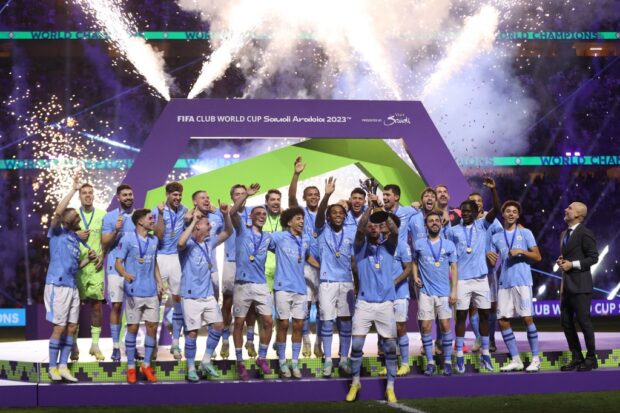Man City celebrates, Euro domination drains Club World Cup drama

[ad_1]

Manchester City’s English defender #02 Kyle Walker lifts the trophy after the FIFA Club World Cup final football match between Brazil’s Fluminense and England’s Manchester City at the King Abdullah Sports City in Jeddah on December 22, 2023. (Photo by AFP)
Manchester City crammed a fifth trophy into a glorious 2023 by lifting the Club World Cup for the first time in Saudi Arabia to continue the domination by European sides of a tournament that has ceased to be competitive.
Not since Corinthians beat Chelsea in 2012 have the Champions League winners failed to follow up that triumph by becoming world champions. City’s 4-0 win over Fluminense was a 22nd consecutive victory in games in the competition for European sides.
A lack of jeopardy is part of the reasoning for a transformation of the competition from 2025.
The current format of seven teams playing a knockout over little more than a week will be ripped up for a 32-team competition spread over the course of a month in the United States in two years’ time.
Fifa is muscling in on European governing body UEFA by seeking to benefit from the commercial attraction of Europe’s elite clubs facing off in knockout competition.
The presence of 12 European clubs will add greater competition, but a tournament designed to crown the best team in the world risks turning into a mini version of the Champions League every four years.
Packing even more games into a congested schedule has been met with a backlash by players union FIFPRO.
The 2025 Club World Cup, scheduled to run from June 15 to July 13, will mean one club season will finish barely a month before another begins.
But Fifa argues it is also necessary to spread resources to major clubs in other continents to avoid the continual flow of the best talent from around the globe to Europe.
“The positive impact that this will have on clubs is going to be huge, because it will increase resources for clubs all over the world to develop and to compete,” said Arsene Wenger, FIFA’s chief of global football development.
“In Europe we are lucky, but it’s important that we make football really global and this creates a chance for other clubs to progress, this is the real target.”
Saudi clubs on the rise
The inevitability that the world’s best players end up in Europe is beginning to be bucked by the host of this year’s Club World Cup.
The Saudi Pro League has snapped up Cristiano Ronaldo, Karim Benzema and Neymar among the star names in its first wave of major signings.
Benzema’s Al-Ittihad, also featuring former Champions League winners N’Golo Kante and Fabinho, lost 3-1 to African champions Al Ahly in the quarter-finals.
But with the project to turn Saudi – which will host the 2034 World Cup – into a football powerhouse just beginning, its clubs could be in a far stronger position to threaten in 2025.
The Gulf Kingdom’s first foray into hosting a major international football tournament did not pass off without hitches.
The 62,000 King Abdullah International Stadium was far from full for the semi-finals and final, despite strong travelling supports from Fluminense and Al Ahly.
City boss Pep Guardiola and Fluminense coach Fernando Diniz also expressed their frustration at the state of the pitch for the tournament’s marquee matches.
However, there was little to discourage FIFA from bringing more events to Saudi, despite the concerns consistently raised by human rights groups.
Critics believe that under its 38-year-old de facto ruler, Crown Prince Mohammed bin Salman, there is an attempt to “sportswash” its human rights record.
The world’s biggest exporter of oil is quickly becoming a go-to sports destination with major events including a Formula One Grand Prix, championship boxing bouts, tennis and golf tournaments.
A future Club World Cup in 2029 or 2033 in preparation for FIFA’s main event in 2034, is also a distinct possibility as long as Saudi seeks to plough its wealth into football.
[ad_2]